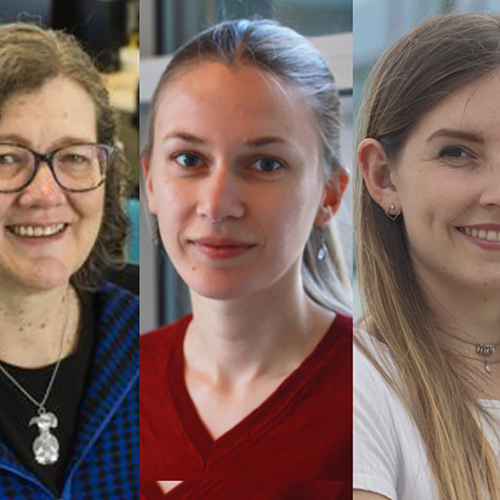The Karen Spärck Jones lecture this year featured inspiring talks from three esteemed women computer scientists: Dr Karen Renaud, Dr Kelly Widdicks and Prof Lynn Kaack.
Hosted by Carron Shankland MBCS, Professor of Computer Science at the University of Stirling, and with an introductory speech by Dame Wendy Hall DBE DistFBCS, the event explored each speaker’s fascinating research project:
- Nudge, Sludge and Dark Patterns (How dark patterns can be used to deceive us and how to detect online sludge) – Dr Karen Renaud
- The climate impact of ICT – Dr Kelly Widdicks
- Artificial intelligence and climate change – Prof. Lynn Kaack
Watch the talks
Nudge, Sludge and Dark Patterns: how dark patterns can be used to deceive us and how to detect online sludge
In this talk, Dr Karen Renaud brings her interest in behavioural economics to discuss choice architecture. She explains the – usually positive – concept of nudging: ‘An attempt to influence people towards a wiser option by manipulating the choice architecture surrounding the behaviour.’
So, trying to influence the environment where the behaviour is happening, but for the ‘good’ of the ‘nudgee’. An example of nudge theory in action includes speed awareness signs which display a smiling face if the driver’s within the speed limit, or a sad face if they’re going too fast.
But when does a nudge become a shove? There is a fine line between where nudging is ethical and where it becomes unethical... sludge and dark patterns are the result.
This is when bad actors take the same techniques which are supposed to be used for good and turn them into something which benefits them. Organisations typically deploy sludge techniques on websites in order to persuade a consumer (via guilt, fear or shame) into compliance or spending more money.
Watch the talk to learn examples of sludge and dark pattens to look out for, insight into the psychology that makes them so effective, and whether young learners are equipped with the skills needed to avoid online deception.
The climate impact of IT
Dr Kelly Widdicks uses her passion for sustainability to explain the environmental impact of ICT at each stage of its lifecycle – from manufacturing to use phase and end-of-life – and to work out what levels of emissions we’re actually dealing with.
For you
Be part of something bigger, join BCS, The Chartered Institute for IT.
Currently, there are limited studies on emissions (which don’t reach a consensus) in addition to truncation errors, which mean that ICT’s full supply chain emissions are not considered in carbon accounting. The big picture is that ICT emissions are wildly underestimated: in reality, they’re equivalent to that of the aviation industry.
In the talk, Dr Widdicks explores questions including: Will efficiency gains reduce ICT’s overall carbon footprint? Is ICT enabling carbon savings in other industries? And will renewable energy decarbonise ICT?
Artificial intelligence and climate change
Prof. Lynn Kaack uses her expertise in climate-related AI policy to explore how machine learning and climate change relate to one another.
The intersection of how they relate can be thought of in three ways:
- AI applications in mitigation and adaptation – AI’s capabilities in reducing greenhouse gas emissions and adapting to a changing climate.
- AI applications that increase emissions and vulnerabilities – including as an indirect cause of emissions increase, i.e., the ways in which systems react to these new technologies.
- Compute-related emissions – although AI constitutes just a portion of ICT emissions, it is fast-growing and part of the bigger picture.
Focusing on AI applications in mitigation and adaptation, Professor Kaak explains the overarching themes of how machine learning can be used to tackle climate change, including:
- Improving forecasting (renewable energy, transportation demand, extreme events)
- Improving operational efficiency (heating and cooling, freight, food waste)
- Predictive maintenance (railway systems, resilient infrastructure)
Watch the full talk to understand more ways in which machine learning is being used in the fight against climate change, including accelerating scientific experimentation and finding the next generation clean energy materials, as well as how AI can be used to gather information on a global, industrial scale and influence decision makers.
About the speakers
 Dr Karen Renaud is a computer scientist, working on all aspects of human-centred security and privacy. She is particularly interested in deploying behavioural science techniques to improve security behaviours and encouraging end-user privacy preserving behaviours.
Dr Karen Renaud is a computer scientist, working on all aspects of human-centred security and privacy. She is particularly interested in deploying behavioural science techniques to improve security behaviours and encouraging end-user privacy preserving behaviours.
 Dr Kelly Widdicks is a lecturer in computer science at Lancaster University, specialising in sustainable and responsible digital technology. She is uniquely skilled in programming, qualitative and quantitative data analysis, human computer interaction and user experience research. She has a passion for sustainability and equality, diversity and inclusion and aims to drive the computing sector in ways which benefit society and the environment.
Dr Kelly Widdicks is a lecturer in computer science at Lancaster University, specialising in sustainable and responsible digital technology. She is uniquely skilled in programming, qualitative and quantitative data analysis, human computer interaction and user experience research. She has a passion for sustainability and equality, diversity and inclusion and aims to drive the computing sector in ways which benefit society and the environment.
 Prof. Lynn Kaack is Assistant Professor of Computer Science and Public Policy at the Hertie School. Her research and teaching focus on methods from statistics and machine learning to inform climate mitigation policy across the energy sector and she also has an interest in climate-related AI policy. She is a Co-founder and Chair of Climate Change AI and a member of the Austrian council on robotics and artificial intelligence.
Prof. Lynn Kaack is Assistant Professor of Computer Science and Public Policy at the Hertie School. Her research and teaching focus on methods from statistics and machine learning to inform climate mitigation policy across the energy sector and she also has an interest in climate-related AI policy. She is a Co-founder and Chair of Climate Change AI and a member of the Austrian council on robotics and artificial intelligence.

















